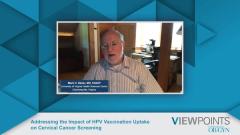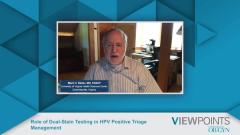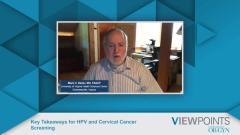
Role of HPV Genotypes in Cervical Cancer
Experts in obstetric and gynecologic management provide insight on the role of HPV genotypes in cervical cancer risk.
Episodes in this series

Dr Thomas C. Wright Jr: The other approach to triaging HPV [human papillomavirus] positive women is to do genotyping. I think everyone is aware of the importance of knowing whether a woman is HPV 16 or 18 positive. We already alluded in this conversation about the high rate of cervical cancer precursors in women are HPV 16 positive. It's about 25 of those women will become CIN2 or 3 positive within 3 years of being diagnosed as having HPV 16. What about other genotypes? Some people are discussing extended genotyping which means you would look for other HPV genotypes such as 31 or 35. Dr Hill, are you aware of that data and have any thoughts about it?
Dr Emily K. Hill: No, I'm sorry I don't know that I have enough expertise to speak on that. I might have to defer to the other panelists.
Dr Thomas C. Wright Jr: Dr Sheth?
Dr Sangini S. Sheth: I don't know the specific data except to know that there are increasing commercial tests available. I think I just saw something earlier this week that 31 was added to one of the assay journals and I often teach that this is an area that we're going to see change over the course of our clinical careers, the more specific genotyping.
Dr Thomas C. Wright Jr: Okay, fair enough. Dr Stoler, you were involved in some of those studies.
Dr Mark H. Stoler: Yes. I think there's more than 1 way to skin this cat, if you want to use that old phrase. The ASCCP [American Society of Colposcopy and Cervical Pathology] has promoted for many years in their guidelines equal management for equal risk. When HPV primary screening was FDA approved, it incorporated partial genotyping, namely HPV 16 and 18 genotyping because of that risk that I've already talked about with particularly HPV 16. If you're HPV 16 positive, you need to get a colposcopy. I don't care what your Pap smear [Papanicolaou test] shows even though Pap smear abnormality will stratify that risk even higher. You have ASC-H and HPV 16. Your risk is so high that you might consider treating the patient without biopsy. What we found out in epidemiological studies over the last 10 years is that the 12 other types that are masked in most of the prior FDA approved assays have differential risks. Just like 16 and 18 have the highest risk, we now know that 31 and 33 in the New Mexico study, (52 if you're in Asia, etc.) have risks that approach the risk of HPV 18. If you're going to take an HPV 18 positive person to colposcopy, why shouldn't you take the HPV 31 positive person to colposcopy? There is an assay on the market today, the Onclarity assay, that has gotten an FDA approval to reveal extended genotyping because it has the capability of unmasking the data that were already there. Other assays don't have that capability, but you can use dual stain to perform equivalently. I think what you're going to see going forward from the NCI [National Cancer Institute] and during guidelines project that's working with practices and manufacturers is that there'll be different ways depending upon which HPV assay is offered in the laboratory to get the right people the colposcopy in their triage step. You might do extended genotyping. You might do dual stain. In some places you might do even a combination, but the point is that not all HPV types are of equal virulence, if you will, in terms of promoting the development of precancer or the rate of transformation to invasive cancer and that we now have that data, so why not use it. I think you're going to see in some practices, HPV extended genotyping where they take into account the other genotypes as a way of improving triage specificity.
TRANSCRIPT EDITED FOR CLARITY
Newsletter
Get the latest clinical updates, case studies, and expert commentary in obstetric and gynecologic care. Sign up now to stay informed.

















